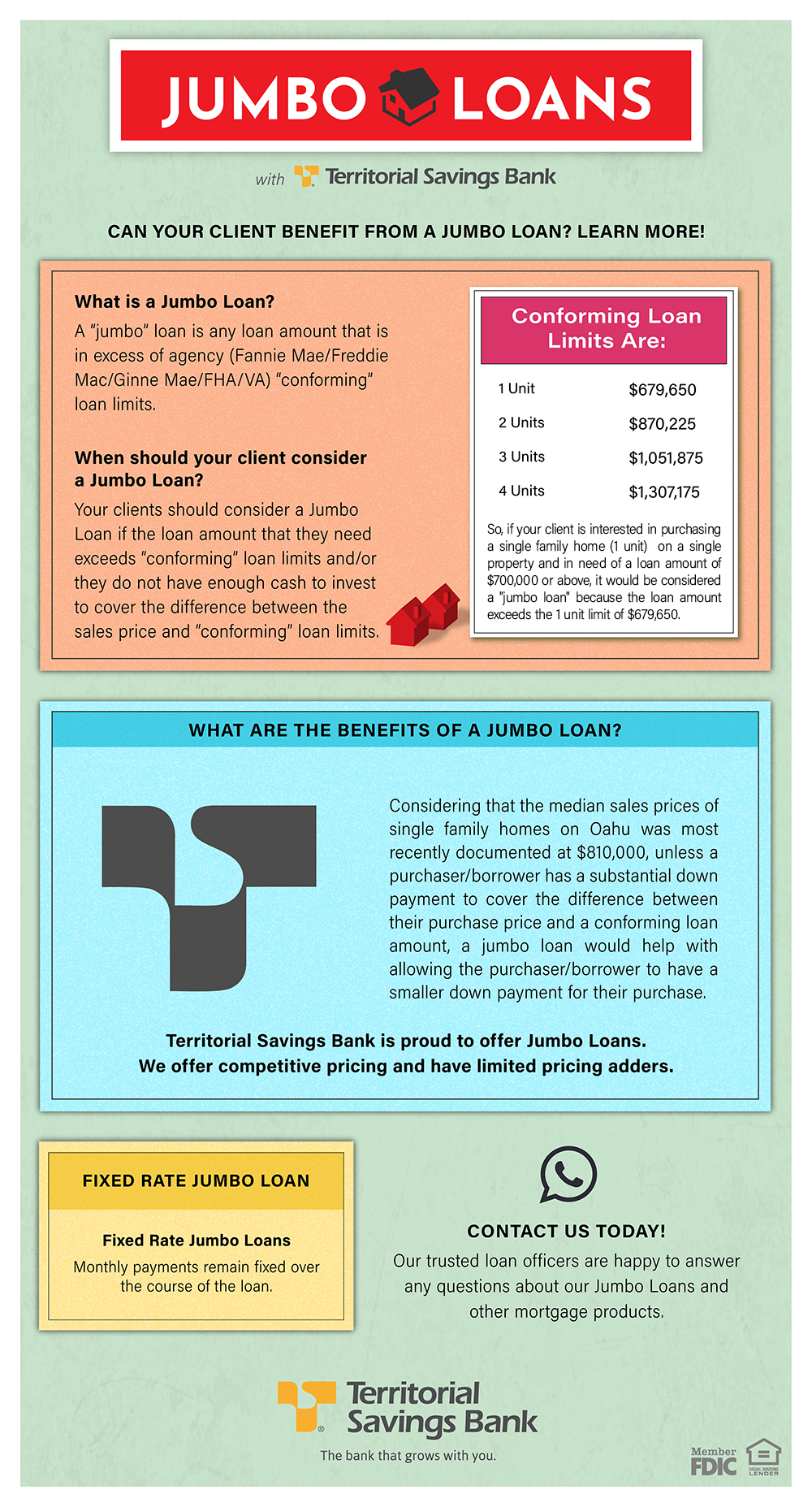Jumbo Loan: Financing Solutions for Houses Above Conforming Limits
Checking Out the Benefits and Characteristics of Jumbo Loans for Your Next Home Acquisition Decision
As the realty market evolves, understanding the details of big lendings becomes progressively pertinent for possible property buyers taking into consideration high-value residential or commercial properties. These lendings not just facilitate significant financing but likewise provide several advantages, such as affordable rates of interest and the potential removal of exclusive home mortgage insurance policy. However, the path to safeguarding a jumbo lending is stuffed with certain eligibility standards that might test some customers. To totally value exactly how jumbo fundings can influence your home acquisition method, it is essential to discover their crucial attributes and benefits in greater detail.
What Is a Jumbo Funding?

Jumbo lendings are typically made use of by buyers seeking to buy high-value properties or homes in expensive markets. jumbo loan. Provided the bigger quantities obtained, loan providers typically impose more stringent credit demands, including higher credit report, lower debt-to-income proportions, and larger deposits. The rate of interest on jumbo lendings might be slightly greater than those on conforming car loans, showing the enhanced risk for loan providers
Furthermore, the approval process for a big finance can be a lot more time-consuming and complex, as lending institutions need extensive paperwork to examine the consumer's economic security. Understanding these subtleties is crucial for prospective home owners thinking about a jumbo finance for their residential property financing demands.
Key Advantages of Jumbo Loans
One significant benefit of jumbo finances is their ability to fund higher-priced residential or commercial properties that surpass adapting lending restrictions. This attribute makes them an attractive option for buyers wanting to purchase high-end homes or residential or commercial properties in high-cost areas where costs typically surpass conventional car loan thresholds.
In addition, jumbo car loans commonly include flexible terms and competitive rates of interest, enabling consumers to tailor their funding to match their special financial circumstances. jumbo loan. This versatility can include options for adjustable-rate home loans (ARMs) or fixed-rate lendings, offering buyers with the capacity to handle their month-to-month payments according to their choices
One more benefit is that jumbo finances do not call for personal home loan insurance (PMI), which can considerably reduce the general price of the loan. With PMI commonly being a significant expenditure for conventional car loans with reduced down payments, preventing it can lead to substantial cost savings in time.
In addition, consumers of big financings normally have access to greater funding quantities, enabling them to purchase residential properties that satisfy their way of life requires. This gain access to encourages purchasers to act decisively in competitive realty markets, securing their desired homes better. On the whole, jumbo financings provide essential advantages for those seeking to fund costs homes.
Qualification Requirements for Jumbo Financings
Jumbo car loans feature specific eligibility needs that potential customers have to meet to protect funding for high-value properties. Unlike traditional financings, which have set restrictions based on the adhering financing limits developed by government-sponsored entities, big fundings exceed these thresholds, requiring stricter requirements.

In addition, big fundings commonly require a considerable deposit, usually varying from 10% to 20% of the purchase cost, depending on the lender's policies and the debtor's financial scenario. Money gets are likewise considered, with several loan providers expecting borrowers to have numerous months' well worth of home loan settlements easily offered. Detailed documents of income and possessions will be required to sustain the car loan application. Fulfilling these eligibility needs can position consumers favorably in safeguarding a jumbo lending for their desired property.
Comparing Jumbo Lendings to Traditional Loans
Understanding the differences between jumbo car loans and traditional finances is important for homebuyers navigating the high-end realty market. Jumbo fundings surpass the adjusting car loan restrictions established by the Federal Real Estate Money Agency (FHFA), which means they are not eligible for acquisition by Fannie Mae or Freddie Mac. This causes various underwriting requirements and demands for customers.
On the other hand, conventional fundings usually stick to these limits, allowing for an extra structured authorization procedure. Jumbo car loans typically need more stringent additional info credit history, larger deposits, and better monetary books. While a standard funding may call for a down repayment of as little as 3% to 5%, jumbo financings typically require a minimum of 10% to 20%.
Rate of interest prices on jumbo loans may vary from those of conventional finances, commonly being a little higher as a result of the increased threat lenders presume - jumbo loan. However, the potential for considerable funding can be beneficial for customers seeking high-end residential properties. Ultimately, comprehending these differences makes it possible for homebuyers to make educated decisions, straightening their funding alternatives with their unique investing in demands and financial situations
Tips for Protecting a Jumbo Loan
Securing a jumbo funding calls for mindful planning and preparation, as loan providers usually enforce stricter demands compared to standard lendings. To improve your opportunities of approval, begin by inspecting your credit click for more rating and resolving any issues. A rating of 700 or higher is normally favored, as it shows credit reliability.
Following, gather your financial paperwork, consisting of tax returns, W-2s, and bank declarations. Lenders normally call for thorough evidence of earnings and assets to assess your capacity to settle the finance. Preserving a reduced debt-to-income (DTI) ratio is also crucial; go for a DTI listed below 43% to enhance your application's competitiveness.
Additionally, consider making a bigger deposit. Several loan providers have a peek at these guys seek a minimum of 20% down for jumbo finances, which not only decreases your funding amount yet likewise signals financial security. Engaging with a knowledgeable home mortgage broker can supply important insights right into the process and aid you navigate various lending institution choices.

Final Thought
In recap, jumbo fundings existing significant advantages for property buyers looking for buildings that exceed conventional finance restrictions. With affordable rates of interest, flexible terms, and the absence of personal home loan insurance coverage, these financings can bring about substantial cost financial savings. However, prospective borrowers must browse stricter qualification standards to get beneficial terms. Complete understanding of both the requirements and benefits linked with big financings is crucial for making educated home purchase decisions in an affordable real estate market.
The interest prices on big finances may be somewhat greater than those on adapting financings, showing the enhanced threat for lenders.
While a standard lending could need a down payment of as little as 3% to 5%, jumbo car loans usually require a minimum of 10% to 20%.
Interest prices on big finances may differ from those of conventional finances, typically being slightly higher due to the boosted risk loan providers assume.Protecting a big financing calls for careful planning and prep work, as lending institutions frequently impose stricter demands contrasted to conventional loans. Lots of lending institutions seek at the very least 20% down for big finances, which not just lowers your car loan quantity yet additionally signals financial stability.